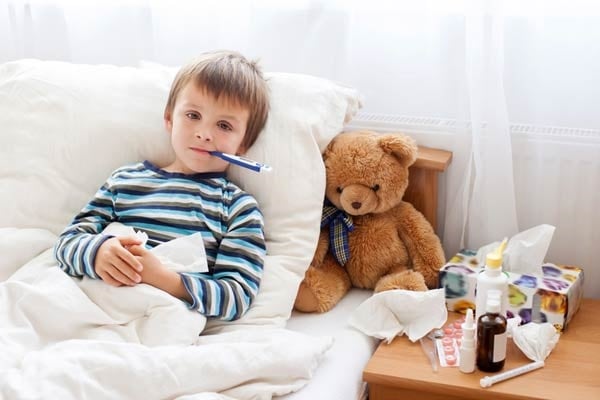
*Updated 12 September 2016 with video.
Antibiotics are highly effective, even life-saving agents against bacterial organisms, and many a mom has been enormously grateful for their extraordinary ability to cure a sick and miserable child. Yet overuse and incorrect use of antibiotics is contributing to a massive public health problem – drug-resistant bacteria – that leaves clinicians with no option for treatment of children and adults.
When the doctor should prescribe antibiotics
Colds and flu and many sore throats are caused mostly by viruses, not bacteria, therefore antibiotics do not cure these conditions.
However, a virus sometimes leads to a secondary bacterial infection, in which case your doctor may prescribe an antibiotic. For instance, when your child gets a bad cold, mucus runs down his throat and he may develop a bacterial infection of the chest. An antibiotic would be prescribed to treat the chest infection, but it doesn’t actually cure the cold.
Diagnoses and prescriptions are complex, even in seemingly simply cases. Your doctor’s decision will depend on the age of the child and the seriousness of the infection. Illnesses in babies under 6 months are always taken very seriously, and likely to be treated quite aggressively. In fact, your doctor is likely to give your child an antibiotic if she is under age 2, as complications may develop more rapidly in young children. He will also consider the child’s clinical conditions such as fever, feeling unwell, or lack of improvement over 24 to 48 hours.
But do we need all these antibiotics? Professor Peter Cooper, head of Paediatrics at the University of the Witwatersrand, says: “I do think that antibiotics are over-prescribed, especially for upper respiratory tract infections and flu. It’s quite unusual for a child to get to 2 years of age without an antibiotic."
Doctors complain that parents demand antibiotics in the hope of a fast cure for a sick child; on the other hand parents say that doctors are too quick to prescribe antibiotics. It seems both have a point. Prof Cooper explains, “To be 100% sure that a condition is viral, you would need an expensive laboratory test. That’s not possible for every case, so doctors may prescribe an antibiotic just to cover the possibility of a bacterial infection, particularly in the case of a young baby.”
Pressure from the parents plays a role, says Prof Cooper, but this is changing. “These days more informed parents are less likely to demand antibiotics,” he says. If a child isn’t too sick or very young, instead of leaping in with antibiotics, you and your doctor might decide to monitor the child’s illness and see if it improves. If not, go back to your doctor.
Prof Cooper advises parents to discuss the child’s diagnosis fully with the doctor. “Find out specifically what he’s treating and what he’s prescribing. If your child doesn’t seem to be improving, go back and discuss child management again or, if necessary, get second opinion.”
Are antibiotics bad for kids?
There’s no truth in the belief that antibiotics somehow weaken the immune system, says Professor Peter Cooper.
However, antibiotics do have side effects. They are a broad weapon. When they kill off the “bad” bacteria, they kill “good” bacteria too. Our bodies are full of bacteria that play an important role in many body processes, such as those in the gut that aid digestion. The main side effects you need to worry about are gastrointestinal problems (an upset tummy or loose stool, for instance) and thrush. Serious side effects are rare and usually not severe, says Prof Cooper, unless the patient is allergic to penicillin, which can be quite serious. Nonetheless, you don’t want to give a child antibiotics unless they are really necessary.
When you do need them, and the diagnoses and prescriptions are spot on, it’s astonishing how antibiotics can help a truly sick and miserable child get back into her old self quite rapidly.
But – and this is a big but – using antibiotics unnecessarily may make future infections hard to treat, and contribute to the rise of antibiotic-resistant strains of bacteria.
Super-bugs
Like all living beings, bacteria change over time in response to their environment. Sometimes, some bacteria will survive a particular antibiotic or more than one and become resistant to them, meaning that the next time they come across these particular antibiotics bacteria will survive.
Drug-resistant bacteria are a serious risk to public health. The Centre for Disease Control and Prevention in the United States says almost every type of bacteria has become stronger and less responsive to antibiotic treatment. This means that when you really need antibiotics, they may not work as well as they could. Resistant strains are also likely to spread quickly through schools and families.
Watch this powerful video from Harvard University showing how bacteria can grow resistant to antibiotics a 1000 times stronger within 11 days:
In particular, says Prof Cooper, Streptococcus pneumonia is cause for concern for parents. “This bacterium is a common culprit of ear and throat infections and of pneumonias. We are getting reports from the laboratories that there is quite a lot of resistance to the antibiotics we would normally prescribe.”
Effectively, that means that the medicine that would have cured your very sick child in a week or so might not work. According to Prof Cooper, this might result in a more serious infection, which will have to be treated with broad spectrum antibiotics, which might have to be given intravenously in hospital.
The main cause of the problem is inappropriate and excessive use of antibiotics. Dr Olga Perovic, Principal Pathologist at the National Institute for Communicable Diseases, adds that over-use of antimicrobial agents and developing resistance is even higher in the private health sector and urges patients not to press for antibiotics that are unnecessary. She adds: “We need to preserve antimicrobials for when we really need them.” We can all help by using antibiotics when indicated, for bacterial infections, by taking them as prescribed and for the correct length of time.
Use antibiotics right
It’s essential that you follow dosage instructions to the letter. Administering antibiotics incorrectly may contribute to the development of resistant strains and jeopardise your child’s recovery. Be sure to:
- Read and follow dosage instructions.
- Be aware that antibiotics may interact with other medications. Some may also cause sensitivity to sunlight.
- Note storage instructions. Some have to be kept in the fridge, especially liquid suspensions once they are reconstituted.
- Always finish the prescribed course of antibiotics. Even if your baby is starting to feel better, he may still be harbouring the bacteria that made him sick. In some clinical conditions antibiotics need to be taken until the infecting bacteria are eliminated from the body. This may be days after the symptoms disappear. If he stops treatment too soon, the infection may return and retreatment may lead to the development of antibiotic-resistant bacteria.
Good advice
1. Vaccinate. When it comes to avoiding antibiotics, prevention is the best option says Dr Perovic. “I strongly recommend vaccines,” she says. “If your child is fully vaccinated, he will be protected from some of the bacteria that cause upper and lower respiratory infections such as Streptococcus pneumonia, which often result in the use of antibiotics.”
2. Don’t push your doctor for an antibiotic for your child. “Choose a clinician that you trust and leave the assessment to him,” says Dr Perovic. Management of patients is complex, and depends on many factors. She gives an example: “If a child has repeated bacterial ear infections, a few times in a year, the clinician might give up to a 10 day course to ensure the bacteria are eradicated. For a simple, isolated infection, one might give a few days’ course or until the child is recovered.”
3. Basic hygiene – just washing hands regularly with soap and water – will go a long way to protect your child from germs. Children are exposed to a great number of germs, and many resistant strains, because they are in close contact with each other, and they often share toys and food.
4. What about natural alternatives? Dr Perovic does not put any store in vitamins and supplements as “natural” immune boosters. For a healthy child who is not immune-compromised, she advocates a good varied diet as the basis for good health and immunity. Prof Cooper agrees, “I don’t believe in so-called natural antibiotics, or using homeopathy or supplements. There is no evidence of efficacy in controlled trials.”
Does your child need antibiotics?
Ear infection
In the past, an ear infection was almost always treated with an antibiotic. Recent studies found that most ear infections will clear up on their own without antibiotic treatment – trouble is you can’t tell which ones. It’s best to take ear infections seriously and to get your doctor’s advice even if you would prefer to avoid antibiotics. Ear infections can be very painful and, if untreated, can lead to hearing loss and, very rarely, even meningitis or infection of the surrounding bone. If there are no signs of complication and your child does not appear to be very ill, your doctor might recommend that you relieve the child’s pain with painkillers and warmth, and take a “wait and see” approach for a few days.
Sore throat
This is usually viral, unless it’s Streptococcus pyogenes – a strep throat (a laboratory test will identify the organism). Strep throat is potentially dangerous, as it can lead to rheumatic fever, therefore repeat infections should be treated with antibiotics.
Urinary tract infection
Often treated with antibiotics.
Sinus infection
Severe cases are treated with antibiotics. Your doctor will make sure it really is a sinus infection and not just the usual mucus of a cold.
How many times have your child been on antibiotics this year? Do you feel your doctor overprescribes antibiotics, or are you the one pressing for a prescription? Are you a doctor dealing with pushy parents? Share your comments to chatback@parent24.com.




 Publications
Publications
 Partners
Partners










